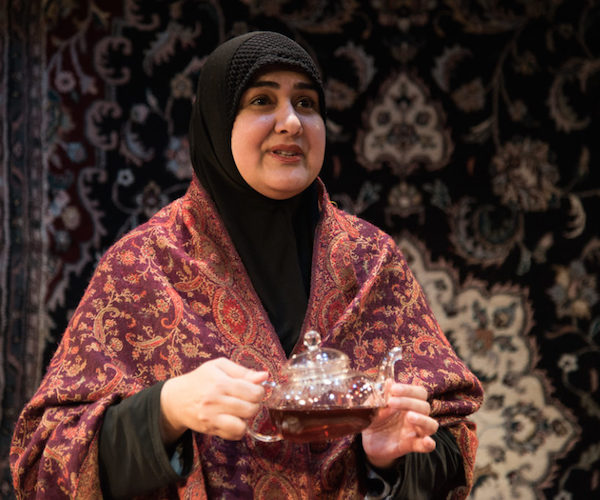Theater Review: “Unveiled” — An Exploration in Understanding
As a storyteller, Rohina Malik exudes warmth and humanity; an air of truth wafts over the stories’ light and humorous moments as well as their explorations of prejudice and hate crimes.
Unveiled, written and performed by Rohina Malik. Presented by New Repertory Company and the Greater Boston Stage Company at the of the Mosesian Center for the Arts’ Black Box Theater, Watertown, MA, through January 28.

Rohina Malik in “Unveiled.” Photo: Andrew Brilliant / Brilliant Pictures.
By Erik Nikander
At the post-show talkback for Unveiled, Rohina Malik, the show’s writer and performer, mentioned that she wrote the play in part to counteract media stereotypes of Muslims. In the post-9/11 world, Muslim actors often had no choice but to play stereotypical terrorists and other vile villains. Malik wanted to do something in the theater that challenged this unfortunate reality. In Unveiled, she assumes five different roles, playing Muslim women hailing from different nations around the world, her intent to provide an in-depth portrait of the joys and struggles faced by each one. Malik notes, with a touch of sadness, that she’d hoped the need for such a show would have subsided in the years since its premiere in 2009. Instead, the invitations she’s received to perform the piece have only increased.
Malik’s concern over America’s persistent anti-Muslim streak is well-founded, but the continued popularity of Unveiled might also have something to do with her skill and compassion as a storyteller. Each of the five women she portrays (including a Moroccan American lawyer, a South Asian rapper living in London, and an African American woman who has converted to Islam) comes across as a distinctive, fully-defined character. Though our time with each character is short, Malik rounds out their personalities, giving us a genuine sense of who they are and what Islam means in their lives. As a storyteller, she exudes warmth and humanity; an air of truth wafts over the stories’ light and humorous moments as well as their explorations of prejudice and hate crimes.
Each of the five segments of unveiled tells a stand-alone story, but small touches that underline commonality thread them together into a cohesive whole. Cultural traditions centered around tea are significant in each of the tales, and beautiful verses by Muslim poets such as Rumi and Saadi are intoned in several. The women often discuss why choosing to wear a hijab is important to them; for some, it provides them with a deep, emotional connection to the divine. By drawing on these various details, Malik paints a picture of Islamic culture that showcases its impressive breadth and texture. Too often, Muslims are depicted in mainstream media as joyless ascetics who embrace religious fundamentalism. Malik, by contrast, presents the Islamic world as one where divinity and worldly delight coexist and intermingle.
The clarity of Malik’s vision is only heightened by the show’s stripped-down presentation in the the black box at the Mosesian Center for the Arts. The show’s set (designed by Jeffrey Petersen) consists of a wood floor and three ornate rugs, one on the floor and two hung as backdrop panels. A single table stands at the center of the stage, a glass pot of tea and several cups and trays on top of it. The sound design consists of gentle, and intermittent, musical accompaniment provided by Alejandro Castellano. And that’s it. No scenic changes, no technological tricks, just a woman on a stage telling stories. It’s a testament to Malik’s talent as a performer that the storytelling is so captivating. Unveiled does away with the unnecessary: the result is an evening that is as moving as it is well-honed and economical.
That said, the production’s spareness has its weaknesses; at times Unveiled feels almost too lean. The show’s runtime clocks in at less than an hour, and five different stories are told over that relatively short period of time. As a result, as good as each of the yarns is, it’s hard not to feel that these characters could support a larger story. As a result, as good as each of the yearn is, there is much that is left unsaid about these characters. You yearn to know them better. This truncated presentation is probably ideal for school groups, but more seasoned theatergoers might prefer Malik challenge their attention spans a little more. In its current form, Unveiled feels more like a theatrical appetizer than a full dramatic meal. A tasty, well-prepared appetizer to be sure, but still not as filling as one might wish.
However, an upside to the short runtime is that Malik’s talkback doesn’t feel like a tacked-on addition to the show. It is an essential part of the experience. On the night I attended, nearly everyone stayed for her discussion. The opportunity to hear Malik talk with genuine insight about the show and her experiences was compelling. She was asked some slightly brusque and insensitive questions about Islam, but she handled them with intelligence and compassion.
So, if you include the talkback, Unveiled manages to make the most of its brief length. It provides audiences a window into the complex lives of a variety of Muslim women, the sort of glimpse that the arts don’t provide nearly often enough. One could hardly ask for a more insightful guide into this world than Malik. Her restraint and clarity of vision — as a theater artist and cultural storyteller — ensure that Unveiled is a remarkable (if frustratingly fleeting) experience.
Erik Nikander is a critic, playwright, and filmmaker based in the New England area. His film criticism can be read on Medium and his video reviews on a variety of topics can be viewed on Youtube at EWN Reviews.
Tagged: Erik Nikander, Islam, Muslim, New Repertory Theatre, Rohina Malik
